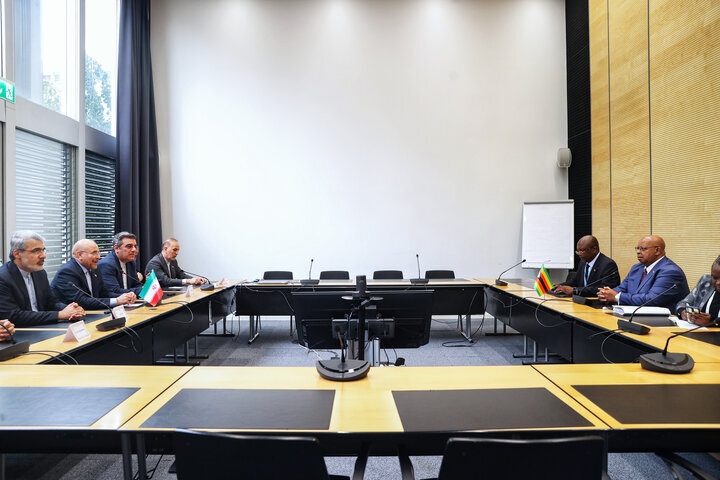Iran Zimbabwe discuss strengthening ties through parliamentary cooperation
Iran, Zimbabwe discuss strengthening ties through parliamentary cooperation
TEHRAN – In a meeting held on the sidelines of the Inter-Parliamentary Union (IPU) Assembly in Geneva, Iran's Parliament Speaker Mohammad Baqer Qalibaf and the Speaker of Zimbabwe's National Assembly, Jacob Francis Mudenda, discussed expanding ties between the two nations.

Both leaders emphasized that strengthening parliamentary cooperation could pave the way for enhancing broader governmental relations.
During their discussion, Qalibaf highlighted the long-standing relationship between Iran and Zimbabwe, noting that both countries share a history of resistance against oppression. This common struggle, he said, provides a strong foundation for cooperation in various fields.
"Parliamentary cooperation between the two countries can serve as a basis for deepening relations between our governments," Qalibaf stated, underscoring the potential for closer collaboration in areas such as healthcare, medical technology, and other knowledge-based sectors.
Qalibaf also addressed the challenges posed by illegal sanctions that have targeted both Iran and Zimbabwe. He proposed that the two countries explore innovative mechanisms, such as barter systems, to overcome banking and financial hurdles.
"By working closely together, we can tackle the issues caused by these oppressive sanctions," he said, calling for greater economic cooperation to mitigate the effects of international restrictions.
In response, Zimbabwe’s Speaker Mudenda expressed his country's readiness to further develop parliamentary relations with Iran.
He acknowledged that both nations face similar challenges, particularly the illegal sanctions that violate international norms. Mudenda also highlighted the strong economic and commercial ties between Zimbabwe and Iran, noting that his country welcomes Iranian investors, especially in the medical sector where Iran has shown significant capabilities.
Expressing gratitude for Zimbabwe's continued support of Palestine and Lebanon, Qalibaf also urged stronger international efforts to address the ongoing crises in Gaza and Lebanon.
He called on governments, parliaments, and nations to unite against the crimes committed by the Zionist regime and work towards a lasting ceasefire. "Iran will support any decision made by the government and people of Lebanon and the Resistance Front," Qalibaf added, affirming Iran’s commitment to standing with Lebanon in the face of regional challenges.
Since October 2023, Israel has expanded its military campaign to include Lebanon as part of its broader offensive in the Gaza Strip. In response to Israeli aggression, Hezbollah has launched several retaliatory attacks, including the use of a hypersonic ballistic missile targeting the occupied Palestinian territories.
Tensions have escalated since late September, with Israel increasing its strikes on Hezbollah positions, resulting in the death of Hezbollah leader Sayyed Hassan Nasrallah and several other senior officials.
According to Lebanon's health ministry, Israeli strikes have killed at least 2,309 people and injured more than 10,782 others since the conflict began.
Hezbollah has vowed to continue its resistance against Israel as long as the Israeli offensive in Gaza persists. The ongoing war in Gaza has claimed the lives of more than 42,000 Palestinians, most of whom are women and children.
source: tehrantimes.com